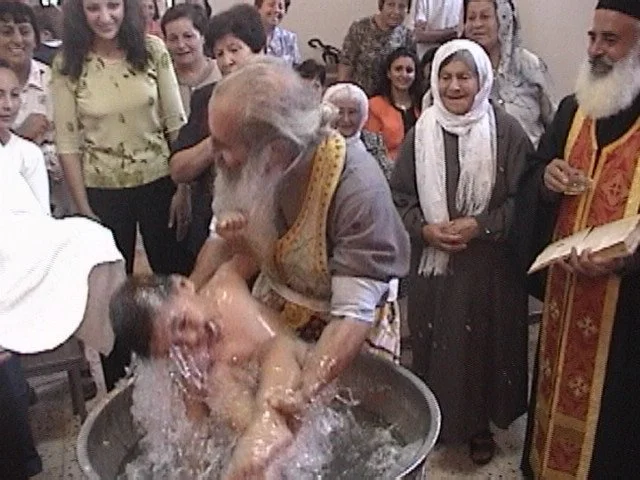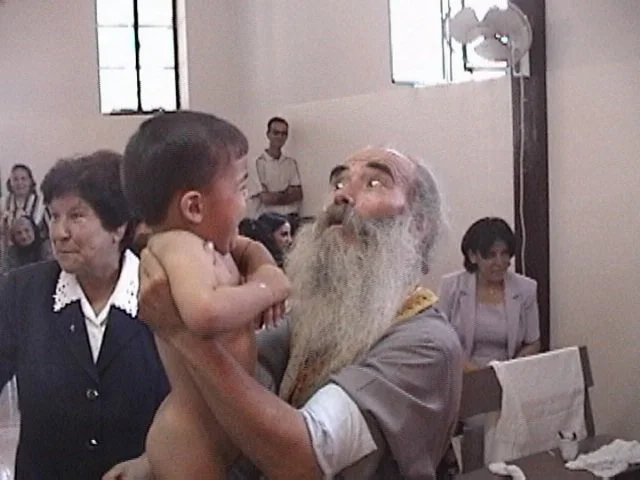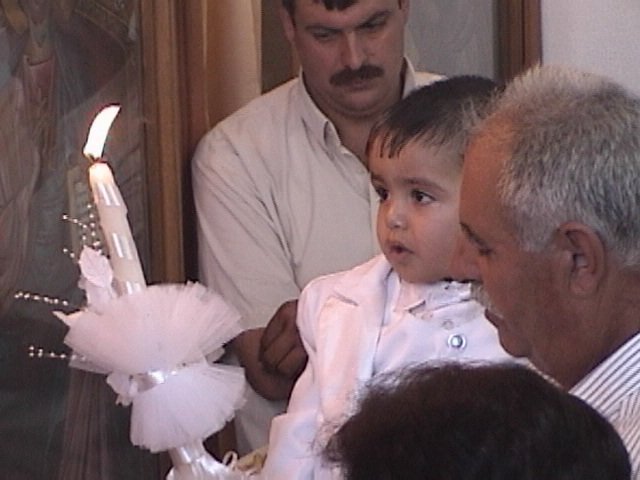August 30, 2002
Today we began work on our long-term project, a film on Christian life in the Northern West Bank. We went down to Tubas, a nearby village with a population of 13-14,000, sixty of whom belong to the Greek Orthodox Church of the Holy Trinity. We have visited with them and gotten to know them several times before, but each time we go we learn a bit more about the different communities around here. The Christians of Tubas are not a remnant community of ancient Tubasi Byzantine Christians (though there are ruins of older churches among the ruins of "Old Tubas" nearby). Rather, they are transplants from some of the villages in the area which were once entirely Christian - Sebastya, Burqa, and others - who over the centuries moved to either Nablus or Tubas, large commercial centers, as numbers dwindled back home. In 1976, a new church was built in Tubas and they recently completed a new church hall as well as a church library. They estimate that, for the 60 Christians living in Tubas, there are 300-some living outside Palestine.
Fr. Justinus prays a blessing over the baptismal waters.
Orthodox baptism includes full submersion, three times.
Fr. Justinus shares a moment with the terrified boy being baptized.
Today in Tubas was special for two reasons: the first was the baptism which we were invited to attend, and which we hoped to film - it was the second Orthodox baptism we'd seen, an elaborate affair where the child is stripped naked, anointed, and then dunked into the water three times to symbolize Christ's three days in the tomb (Paul's reference to being buried with Christ in baptism is part of the liturgy). The second was the presence of Fr. Justinus, the Greek priest who is responsible for building the Greek Orthodox Cathedral of Jacob's Well in Nablus. He has, at different times, served as an "interim priest" in various villages in the area - including Tubas and Zababdeh. Because of the baptism he came today, breaking the curfew in Nablus to do so. A Greek citizen, and clearly a priest (long whispy grey hair and white beard flowing down over his black robes), he has less fear of being shot for breaking curfew than other Nablus residents. He and Fr. Thomas from Zababdeh shared worship leadership duties.
Following the baptism was the typical meal of mansaaf, a hot dish of rice, meat, and delicious yogurt sauce. Many others came from Zababdeh for the celebration. Between the weekly prayers and the baptism, we spoke to the church about what we had been doing that summer, visiting churches in the US and telling them about the "salt of the earth," the minority Christian community. We told them that we hoped we could learn from them how to be "salt of the earth" in the US, a small minority who know the situation endured by Palestinian Christians but have a wider impact on American attitudes.
The newly baptized child is now reclothed and comforted.
Dr. Mustafa Barghouti.
We then went out to the Naim Khader Center on the outskirts of Zababdeh to hear Dr. Mustafa Barghouti speak. He is one of the Palestinians who is often on TV and interviewed on the radio, a brilliant intellectual and a great spokesman with great personal integrity. He is making the rounds, drumming up support for a Palestinian National Initiative that folks like he and Edward Said are involved in. The idea is not to repeat the mistakes of Oslo, nor the corruption of the PA, but to encourage a Palestinian people's movement which will seek to define itself separate of a negotiation strategy. "To be, or not to be", he began. His honesty and directness are well-respected, but he doesn't have the symbolic stature of Arafat. We couldn't help but hope that what we attended today was the beginning stages of something powerful in the making. Hope against hope...





